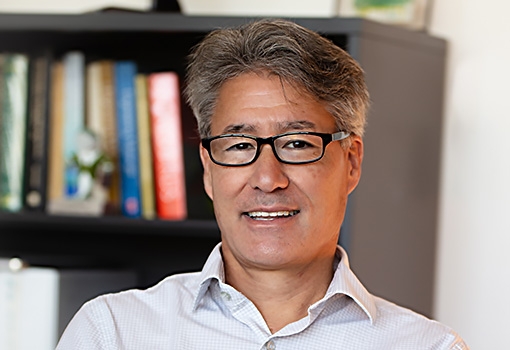On June 17, Jeff Sakamoto, professor of materials and mechanical engineering at UC Santa Barbara, was announced as one of twelve members of the 2025 Class of Fellows of The Electrochemical Society (ECS).
Sakamoto, a widely recognized battery expert who came to UCSB in 2024 from the University of Michigan, with three decades of research experience in the field of electrochemistry, holds the Mehrabian Endowed Chancellor’s Chair at UCSB and is director of the U.S. Department of Energy’s Mechano-Chemical Understanding of Solid Ion Conductors Energy Frontier Research Center (MUSIC). Sakamoto, who has developed Li-ion batteries for the NASA 2003 Mars Exploration Rovers and ceramic electrolytes for advanced electrochemical technologies, now works as part of a collaborative group of UCSB faculty whose research is aimed at developing next-generation batteries.
“We were delighted in 2024 when Jeff Sakamoto, a native Californian, arrived at UCSB after a distinguished decade of service at the University of Michigan,” said Umesh Mishra, dean of The Robert Mehrabian College of Engineering at UCSB. “He continues to distinguish himself here, both as a researcher and as an amiable colleague and mentor, while serving as a leader of the college’s highly collaborative battery-research group. His election as a Fellow of the Electrochemical Society is a well-deserved honor for which we send him hearty congratulations.”
"Electrochemistry and the electrochemical technologies it enables play an important role in creating a sustainable energy future,” Sakamoto said. “It's also an exciting field that attracts interest from industry, academia, and students alike. I feel honored to be appointed as a fellow of the Electrochemical Society."
After completing a PhD in Materials Science and Engineering at UC Los Angeles in 2001, he held positions at the University of Michigan, Michigan State University, and the NASA Jet Propulsion Laboratory. In the earlier stages of his career, he studied, separately, the fields of electrochemistry, ceramic electrolytes and ceramic processing, and the mechanics of materials. In recent years, the three fields converged to align with the emerging field of mechano-electrochemistry, the multidisciplinary field that involves studying the coupling between electrochemistry and physical forces. Examples of the mechano-electrochemical phenomena Sakamoto studies are the mechanical stability and kinetics of ceramic electrolyte-metal electrode interfaces, anode-free manufacturing, and stress corrosion cracking at fluid electrode-solid ceramic interfaces.
Advancing electrochemical technologies from fundamental to applied to commercialization research has been an integral part of Sakamoto’s career. He has more than thirty-five issued and pending patents licensed by two startups, which he founded or co-founded to commercialize components for advanced electrochemical technologies. He is a Kavli Fellow and was honored with the NASA Inventions and Contributions Board, Major Space Act Award for intellectual property (2006); the Jet Propulsion Laboratory Solar System Exploration Programs Directorate Bonus Award (2004); and multiple teaching awards.
According to ECS, “The designation of ECS Fellow was established in 1989 to recognize advanced individual technological contributions to electrochemistry and solid state science and technology, and for service to the Society. These members are recognized for scientific achievements, leadership, and active participation in the Society. Each year, up to fifteen renowned scientists and engineers are chosen by their peers for this honor.”
